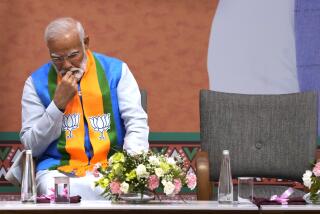India’s Parties Scramble to Form Alliances as Prime Minister Resigns
- Share via
NEW DELHI — As Prime Minister P.V. Narasimha Rao resigned Friday, humbled by his Congress (I) Party’s greatest electoral fiasco ever, India’s politicos searched and schemed to find a successor and a new government.
“There is a race for the tape going between parties,” said Pran Chopra, a senior researcher at New Delhi’s Center for Policy Research, a think tank.
With millions of votes still uncounted, India’s politicians were already burning up the telephone lines, streaking around New Delhi in boxy white sedans and trying to cut advantageous deals with regional power brokers.
“We feel we are the single largest party, and the president is duty-bound to invite our leader to form the next government,” said Pramod Mahajan, general secretary of the Bharatiya Janata Party, declining to give details of the group’s closed-door dealings.
The right-wing Hindu BJP, which emerged as the country’s leading party in parliamentary elections that ended this week, held a news conference to stake a claim on India’s next government.
The National Front-Leftist Front, a loose amalgam of leftist, secular and communist parties, countered that it has priority, claiming that, if considered as a bloc, it got more votes.
Politicians from throughout the country were flocking to the capital to join in the battle for the prize: government of the world’s second-most-populous nation.
“It appears we will form it,” said Jyoti Basu, veteran West Bengal leader and member of the Communist Party of India (Marxist) Politburo, in Calcutta before leaving for New Delhi.
“The only coalition in sight is a Congress-NF-LF one,” said Union Power Minister N.K.P. Salve, a Congress member.
The problem for all parties is that none scored a knock-out blow at the ballot box and that all need allies to secure a majority in the 545-seat lower house of Parliament.
“The Congress has lost, but no one has won,” External Affairs Minister Pranab Mukherjee said.
Rao, the chief loser in India’s 11th general election, submitted his resignation Friday to President Shankar Dayal Sharma, who asked Rao to stay on as caretaker until a new government can be formed.
Rao had brought India five years of reassuring stability after the back-to-back collapse of two left-center coalitions in 1989-1991 and the national trauma of Rajiv Gandhi’s assassination in 1991.
Rao’s government scrapped the economic policies that had kept India fenced off from the world for four decades.
“Rao’s is the tragedy of a scholar and manager failing to grow into a statesman and leader,” was the Indian Express newspaper’s front-page assessment. “His approach, ultimately, was that of an intriguer who could keep an organization under control rather than proving a leader capable of inspiring a party to victory.”
The rout at the polls shrank Congress to the third-largest contingent in Parliament for the first time and was its worst showing since elections to the lower house, or Lok Sabha, began in 1951.
Despite this, Rao has fought hard to keep his post as party president. Some members, however, object.
“We have hit the lowest, and this calls for a change in leadership,” former minister Kamal Nath said.
The deals that India’s politicians could cut to form a government are so richly varied that one newspaper on Friday ran an explanatory chart that looked like a blackboard covered with algebraic equations. Even ringing statements of party ideology are negotiable as parties hammer out programs to rope allies in.
“I forget which American said that the art of politics is to write platforms and then explain after the election why they can’t be enacted,” said a senior leader of the Janata Dal, a party in the NF-LF.
The result of such negotiations may be a succession of governments that quickly rise and fall.
The incoming Lok Sabha may be so hopelessly deadlocked that the country could be back at the polls within 12 to 18 months, Chief Election Commissioner T.N. Seshan has said.
With two-thirds of the ballots counted, analysts Friday said the BJP, which won just two seats in 1984, should have as many as 185 seats in Parliament.
But the party is uniquely hobbled in its search for allies by its Hindu revivalist philosophy, which is particularly frightening to India’s 120 million Muslims, the country’s biggest minority.
The BJP may need to water down its manifesto, which calls for India to drop more than 20 years of official ambiguity and unabashedly proclaim itself a nuclear power and for an end to separate civil code provisions for Muslims.
The BJP’s prime ministerial candidate, Atal Behari Vajpayee, is expected to call on the president today to formally ask to be allowed to form a government.
More to Read
Sign up for Essential California
The most important California stories and recommendations in your inbox every morning.
You may occasionally receive promotional content from the Los Angeles Times.













